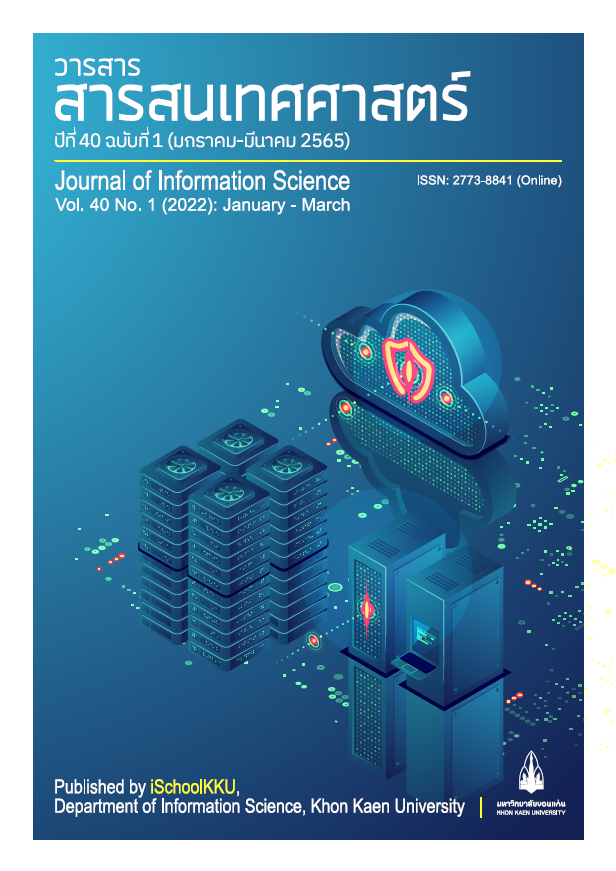Information, Media and Digital Literacy Development Framework for Distance Students in Higher Education
DOI:
https://doi.org/10.14456/jiskku.2022.1Keywords:
Information literacy, Media literacy, Digital literacy, Distance students.Abstract
Purpose: This study aimed at developing information, media and digital literacy (IMDL) development framework suitable for distance students in higher education.
Methodology: The research method included documentary and qualitative research. Key informants consisted of documents, twelve Thai and Filipino key persons in distance education and IMDL area, and twenty teaching faculty, educational technologists and librarians involved with distance students’ IMDL development. Thirty-eight participants including STOU teaching faculty, librarians and graduate students were purposively selected and on a voluntary basis to try out the strategy through the developed activity. The research instruments included documentary analysis forms and interview/focus group guidelines. Content analysis was used for qualitative data analysis.
Findings: Research findings showed that 1) the “SSS” (Students – Staff - System) model for IMDL development framework for distance students in higher education was comprised of principles, key strategies and indicators, focusing on students as the center for the holistic development, the new roles and competencies of faculty members, distance educational designers, librarians, as well as the management system, distance educational and learning management system, supporting service system, digital technology and infrastructure system and digital learning environment; and 2) teaching faculty, librarians and students were very satisfied and benefited from participating in trying out the activities and recognized their roles.
Applications of this study: This research is a guideline for educational institutions and related agencies to use in driving information, media and digital literacy in an open education and distance learning environment in which online education and learning are the new normal of society and everyone is a student or distance learner through online learning.
Downloads
References
Ammatwong, S, Sacchanand, C. & Panmekha, P. (2013). Information literacy of Sukhothai Thammathirat Open University graduate students. Sukhothal Thammathirat Open University Journal, 26(1), 106-122.
Gillan, H. (2016). Information and digital literacy: A strategic framework for UQ library 2016-2030. Retrieved 20 January 2019, from https://web.library.uq.edu.au/files/14363/UQL_IDL_StategicFramework.pdf
Hammons, J. (2020). Teaching the teachers to teach information literacy: A literature review. The Journal of Academic Librarianship, 46(5), 1-13. https://doi.org/10.1016/j.acalib.2020.102196
Harrison, S. J. & Deans, M. O. (2021). The methodology used to deliver information literacy instruction by a select group of academic librarians: a case study. Asian Association of Open Universities Journal, 16(2), 177-192.
Indira, K (2009) Designing information literacy modules for distance learners in India. Asian Journal of Distance Education, 2, 1–18.
Komlayut, S. (2018). Digital literacy of STOU's faculties and graduate students. Nonthaburi: STOU.
Lee, A.Y.L. & So, C.Y.K. (2014). Media literacy and information literacy: Similarities and differences. Comunicar: Media Education Research Journal, 21(42), 137-145.
Maphosa, C. & Bhebhe, S. (2019). Digital literacy: a must for open distance and e-learning (ODeL) students. European Journal of Education Studies, 5(10), 186-199.
Ministry of Education. (2009). National qualifications framework for higher education in Thailand. Thai Government Gazette, 126(125),17-19.
Mnkeni-Saurombe, N. (2015). Information literacy: A cornerstone for open distance learning at the University of South Africa. Journal of Librarianship and Information Science, 47(2), 156-165.
The Open University. (2021). Digital and information literacy framework. Retrieved 19 January 2019 from https://www.open.ac.uk/libraryservices/subsites/dilframework/
Office of the Educational Council. (2018). National Educational Standard 2018. Bangkok: Office of the Educational Council.
Osathanukroh, K. (2011). Development of the self learning kit for searching and accessing information for new master students, Sukhothai Thammathirat Open University. M.A. thesis, Sukhothai Thammathirat Open University.
Partnership for 21st Century Skills. (2011). Framework for 21st century learning. Retrieved 20 January 2019, from http://www.p21.org/overview.
Polsaen, R. (2013). Desirable characteristics of STOU Graduates. Nonthaburi: Sukhothai Thammathirat Open University.
Pong, A. (2017). Media and Information Literacy (MIL). Retrieved 19 January 2019, from https://www.slideshare.net/arnielping/media-and-information-literacy-communication
Sacchanand, C. (2002a). Information literacy instruction to distance students in higher education: li-brarians’ key role. 68th IFLA Council and General Conference August 18-24. Retrieved 19 January 2019, from http://www.ifla.org/IV/ifla68/papers/113-098e.pdf
Sacchanand, C. (2002b). Librarians as educators in supporting a graduate distance education sys-tem: A case study of Sukhothai Thammathirat Open University(STOU), Thailand. EdD doctoral thesis, Faculty of Education, Charles Sturt University.
Sacchanand, C. (2004). Librarians as faculty in the new learning Environment. Asian Library and Infor-mation Conference Libraries- Gateways to Information and Knowledge in the Digital Age. ALIC 2004. Bangkok: Thailand.
Sacchanand, C. (2008). Putting the Learners into E-learning: An Experience of Sukhothai Thammathirat Open University (STOU), Thailand. the E-learning section, International Federation of Library Asso-ciations and Institutions FLA 74th. Quebec: Canada.
Sacchanand, C. (2009). Educational roles of academic librarians: A case of the distance education doc-toral degree program, Sukhothai Thammathirat Open University, Thailand. In Globalizing Academic Libraries Vision 2020: International Conference on Academic Libraries. (180 – 186). Delhi: Mittal Publications New Delhi (India) in association with Delhi University Library University System, University of Delhi.
Sacchanand, C. (2016). Development of distance training package between Sukhothai Thammathirat Open University (STOU), Thailand and Open University of Japan (OUJ). Journal of Japanese Studies, 33(2), 44-58.
Sacchanand, C. (2019). The state of information, media and digital literacy development for distance students of Sukhothai Thammathirat Open University (STOU) and Polytechnic University of the Philippines Open University System (PUP OUS). Sukhothai Thammathirat Open University Journal, 32(2), 55-69.
Sacchanand, C. (2020). Information literacy in the digital environment. Journal of Social Sciences and Humanities, 46(1), 1-17.
Sacchanand, C. & Jaroenpuntaruk, V. (2006). Development of a web-based self-training package for information retrieval using the distance education approach. Electronic Library, 24(4), 501 – 516.
Tongprayoon, C. (2015). The desired characteristics of Thai graduates in ASEAN context. Electronic Journal of Open and Distance Innovative Learning (e-JODIL), 5(1),91-110.
UNESCO. Communication& Information Sector. (2013). Media and information literacy. Retrieved 20 January 2019 from http://www.unesco.org/new/fileadmin/MULTIMEDIA/HQ/CI/CI/images/Publication_covers/global_mil_chap_1.jpg
UNESCO Institute for Information Technologies in Education. (2021). Media and information literacy. Retrieved 20 January 2019, from https://iite.unesco.org/mil/








